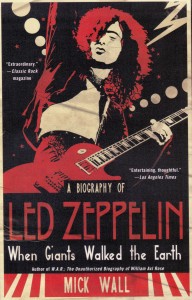Led Zeppelin: When Giants Walked the Earth by Mick Wall (2008. St. Martin’s. ISBN 978-0-312-59039-0)
I know. The lyric is from the Grateful Dead, not Zep’. But after reading Mick Wall’s comprehensive biography of the quartet, it just seemed to fit. The author (who didn’t come onto the music scene soon enough to personally chronicle the first real power quartet to meld classical, rock, soul, and blues into music that grabbed hold of popular culture; taking work done by other bands like Cream and the Stones and the Beatles to a new and unexpected plain) uses personal interviews, archived materials, news reports, and the like to pull together a very comprehensive and thoroughly enjoyable peek into the lives, demons, and thoughts of the four founding Zeppelin members. It’s, in the end, a well-written book that makes you want to listen to lesser known Zep tracks and simply chill while Jimmy Page’s genius as a guitarist and producer washes over you like the wall of sound that crashed over millions of fans during the band’s zenith.
There is no question after reading Walls’ chronicle of the parade of booze, drugs, groupies, sessions, antics, and concerts that made up the lives of Jimmy Page, John Paul Jones, Robert Plant, and John “Bonzo” Bonham for the better part of a decade, that the lads were lucky that only Bonzo died of an alcohol and drug induced stupor (choking on his own vomit in 1980). Bonzo’s demise spelled the end for Zep, though, as Walls sketches the story, the band had already passed its creative prime and was headed towards a collective crash landing at the time of the drummer’s death. Bonzo’s death (a man revered by many as the greatest rock drummer of all time) simply solidified what was already in process: the end of Zeppelin. The odd three man reunions that took place thereafter (with Bonzo’s son Jason filling in on drums) never rekindled the magic of the band’s six studio albums or the live performances of the mid-1970s and, in many ways, were like the return of an aging athlete to his beloved sport when he’s past his prime. Walls does a very fine job of following the careers (or, in the case of Jimmy Page, non-career) of the surviving band members, making it very clear that Robert Plant, the voice of Zep, was already on the way out when Bonzo died and, with his solo career well launched (including a fist full of Grammys for his work with roots star, Alison Krauss), has never had regrets that Led Zeppelin finally, like the famed Hindenburg, crashed and burned. John Paul Jones, the most inventive and adept musician of the bunch, has found satisfaction in producing the work of others and appearing as a session player on many, many albums since the demise of the band. It is only the sad lament of lead guitarist and band leader, Jimmy Page, who has, since Bonham’s passing, floundered. Walls paints the picture of Page as an old man desperate to recreate what he once had and lost, pleading, begging, for Plant to come back to the fold to recreate the impossible.
Taken by promoter Tats Nagashima to what he boasted was “the most elegant restaurant in Tokyo”, Bonzo grew fed-up with being served sake’ in tiny cups and demanded “a beer mug or some buckets”. Later that night, they paid a visit to Tokyo’s famous Byblos disco where Bonzo showed his disapproval of the music by urinating from a balcony on the DJ. Bundling the drunken drummer into a cab, Cole finally gave up and left him to collapse on the street just feet from the entrance to the Tokyo Hilton where they were staying. The next day, Bonzo and Cole bought Samurai swords, and drunk again that night, began enacting a sword fight at the hotel, slashing and cutting at anything they could: chairs, curtain, mirrors, paintings. For an encore, they snuck into John Paul Jones’ room and carried his still sleeping body out into the hall where he spent the rest of the night…At the end of the night, the Hilton banned Led Zeppelin for life…
This passage reflects the sort of “all hands on deck” writing style Walls employs (to much success) through most of the book. The only criticism I have of the biography is Walls’ use of fictionalized “first person” vignettes interspersed throughout the book: These passages detract from the thorough journalism Walls employs and, are in a word, quite silly. But for this ill-advised device being employed, the book would be a five star read.
In the end, if you want to understand where all that fantastic music came from, this book is a good place to start. Fifty pages into the story, you’ll want to buy the six Zep albums and surround yourself with their collective genius.
4 and 1/2 stars out of 5.



